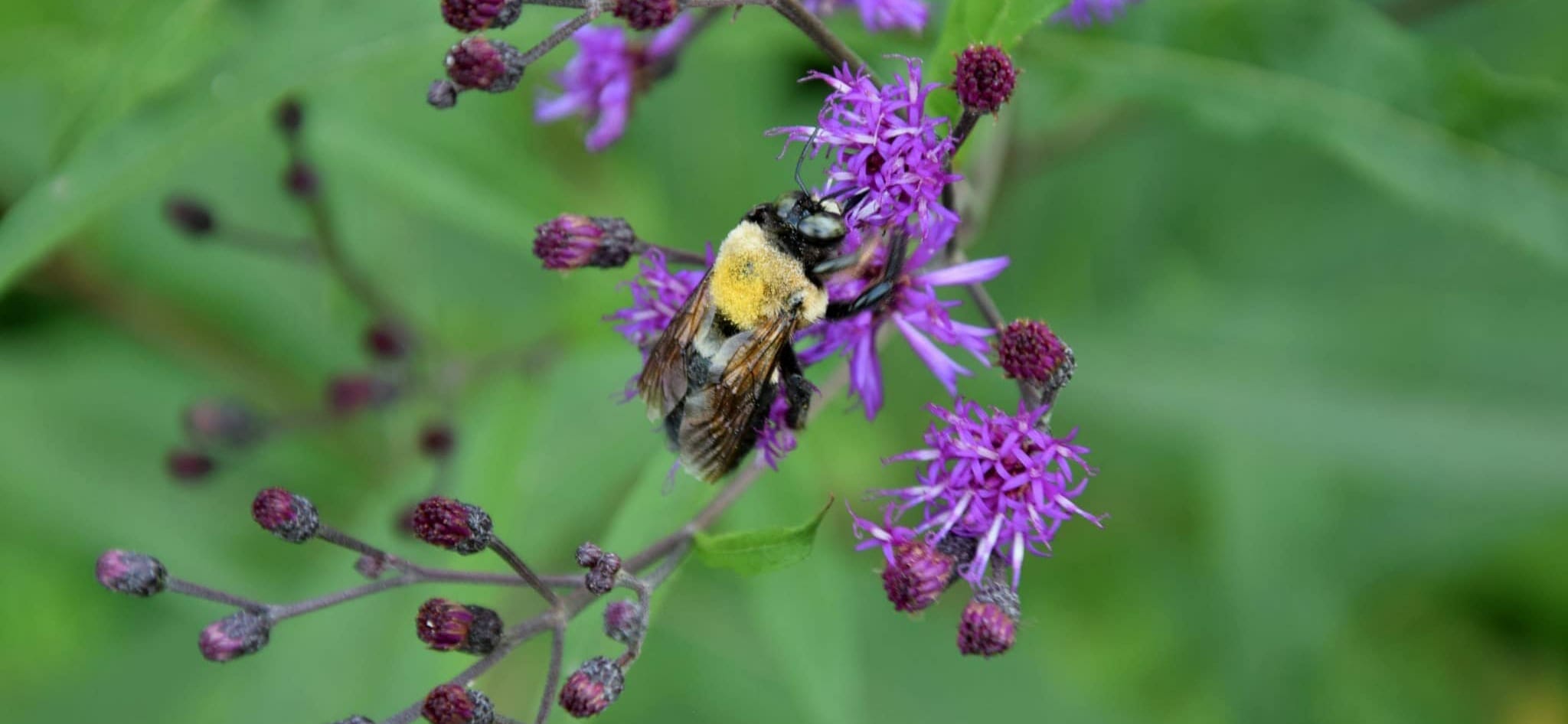
Ironweed (Vernonia gigantea) and friend.
Are you a Chapter Member?
When GNPS reorganized to a statewide-focused, chapter-oriented structure in 2019, most members were not affiliated with any of the three existing chapters. One of our missions over the past year or so has been to foster the development of new chapters and to encourage members to affiliate with them, even as these chapters are starting up. And many of you have done so, either as part of renewing your membership or by visiting your Member Profile on the web site to make updates. But as recently as a month ago, over half of our members remained unaffiliated with a chapter. And nowhere was this more apparent than in the Atlanta Metro area, where we have many members, but we never had any chapters.
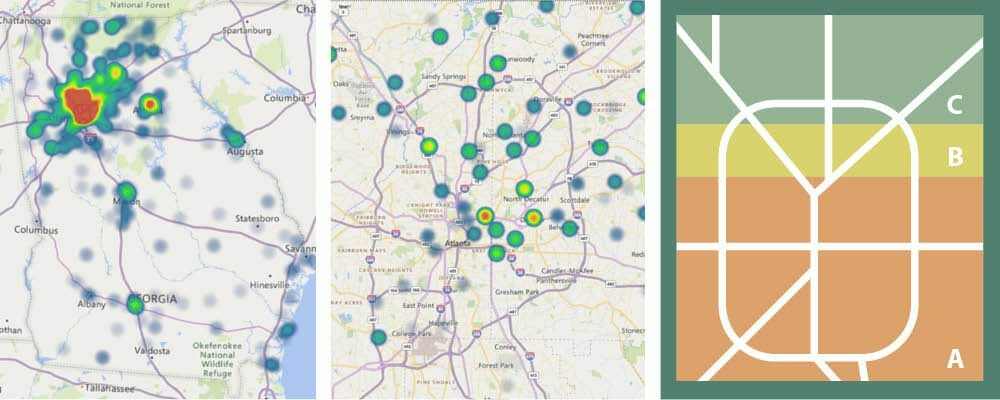 Left: Statewide GNPS member distribution. Center: Detail of Metro Atlanta member distribution. (Both maps are based only on zip codes, and members are actually distributed more broadly.) Right: Approximate regions of current metro recruitment efforts.
But this has changed. As you can see in Chapter News below, both the North Metro Atlanta Chapter and the Intown Atlanta Chapter are speeding through the process of organization. It's a common assumption that chapters have fixed boundaries and that members are assigned to chapters based on their location, but neither of those is true. Members have their own reasons to affiliate, and we would rather not assume that a member prefers going to a meeting or activity in midtown Atlanta, for example, over one in say, Roswell. In the past month, members in what is approximately shown as the "A" region above were given help in joining the Intown Atlanta Chapter, with an easy way to opt out. In the very near future, a similar offer will be made to members in the "C" region, helping them to join the North Metro Atlanta Chapter.
However many of you, including those in the "B" region (not to mention those of you in other surrounding areas of Atlanta or other parts of the state), will need to make the choice on your own — it's harder for us to guess how we can help you. So, if you are not affiliated, now is a good time to go to the Member Portal, (requires login), select "Manage Membership" on the right, and in the "What would you like to do?" dropdown, select "Join a regional chapter." Your membership is unaffected by whether or not you are a chapter affiliate, but a portion of your dues goes to support a chapter that you designate, and you will be on their list for communication about local events. Most GNPS events statewide are open to all members of all chapters, the most notable exception being elections for chapter boards and other official business.
Plant of the Year
Start thinking about your favorite native plant, and watch for an upcoming announcement about Plant of the Year nominations opening on October 11th.
Plant Spotlight: Wingstem (Verbesina)
Ellen Honeycutt
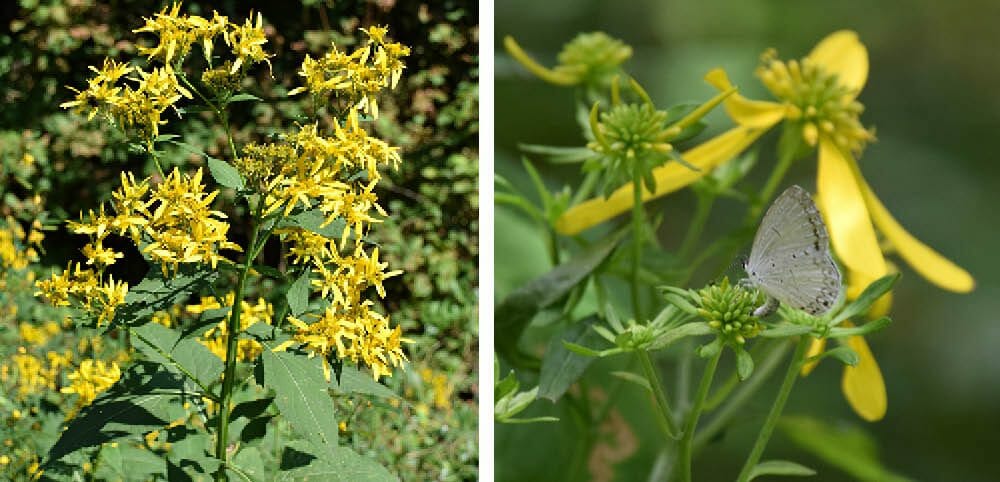 Left: Verbesina occidentalis. Right: Summer azure on V. alternifolia.
Verbesina is a genus that includes eight species in Georgia, most of them tall and robust plants that thrive in damp areas throughout Georgia. The common name wingstem comes from winged ridges on the stem of most species. Another common name is crownbeard, but individual species have other unique names like yellow ironweed, cowpen daisy, and gravel weed. Several of the Coastal Plain species are of special concern in Georgia.
In the Coastal Plain, some of these species have already finished blooming, but three species are likely blooming now and are fairly common: Verbesina alternifolia, with yellow flowers and found through the state, has alternate leaf arrangement and wings. Verbesina occidentalis, also with yellow flowers and found throughout the state, has opposite leaf arrangement. White crownbeard, Verbesina virginica, is one of only two species to have white flowers and found throughout the state, is noticeably different.
The remaining five species are all only found in the Coastal Plain: Verbesina aristata, Verbesina encelioides, Verbesina helianthoides (a species of Special Concern in Georgia), Verbesina heterophylla (noted as Critically Imperiled in Georgia), and Verbesina walteri, the other white-flowering species but it has no ray flowers (also of Special Concern in Georgia).
In my yard, wingstem (V. alternifolia) gets very tall (up to 10 feet) in damp areas and serves as host plants for two butterflies: the Silvery checkerspot butterfly and the Summer azure butterfly. I leave some of the thick stems to provide homes for insects like bees that use the hollow stems. If you want to include some, be sure to give it some room.
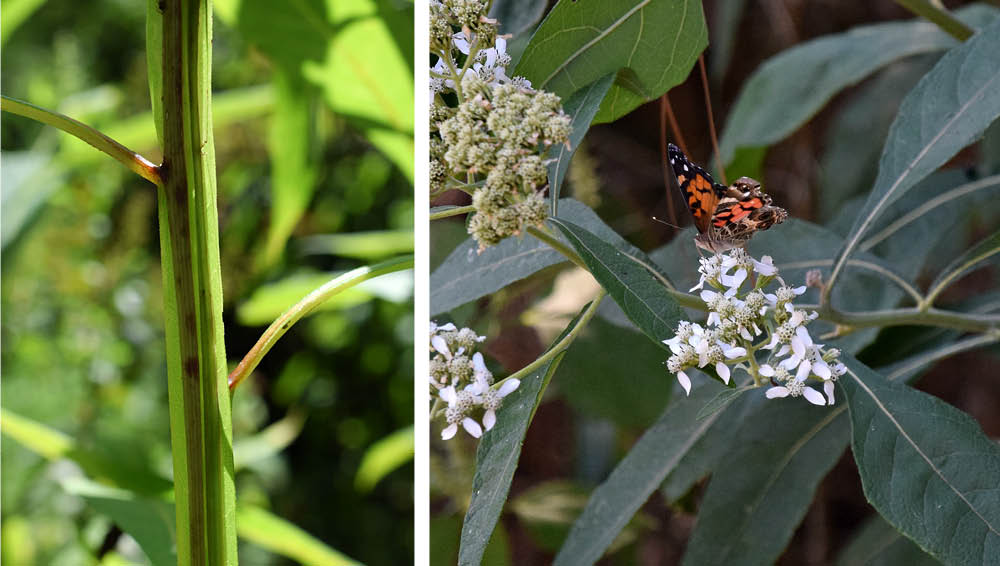
Left: Closeup of stem of Verbesina alternifolia, showing winged ridges. Right: Verbesina virginica and American lady butterfly.
Native Fauna Need Native Flora: Double-banded Scoliid Wasp (Scolia bicincta)
Deborah Ashley
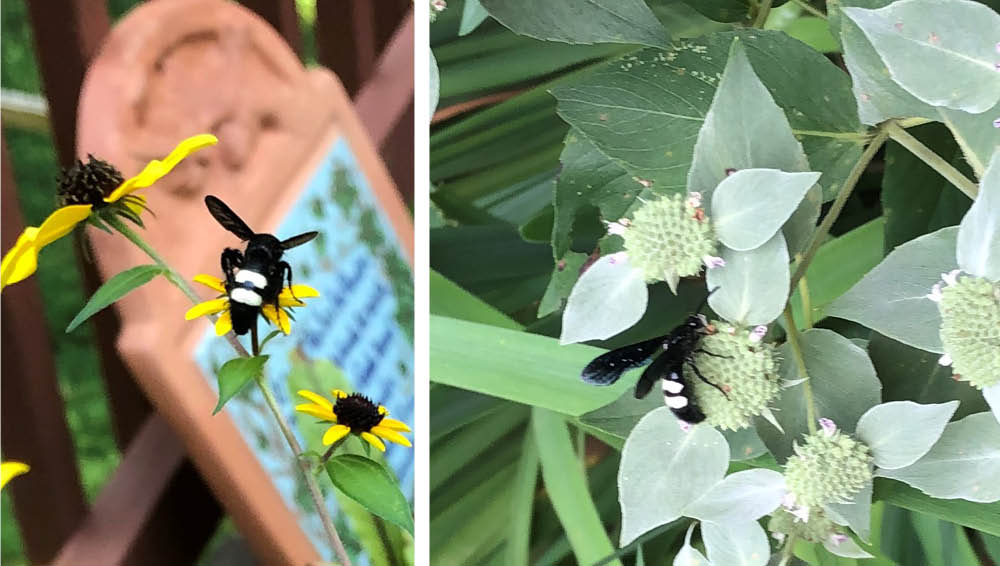
Left: Double-banded scoliid on cutleaf coneflower. Right: White mountain mint, a favorite of scoliid wasps.
I’ve had the pleasure of watching the double-banded scoliid wasp for many years in my pollinator garden and thought they were incredibly beautiful. That’s about all I knew.
Composed of fairly large, sturdy bodies, the family of Scoliidae are ofen brightly patterned in colors of white, red, yellow and black. The double-banded scoliid wasp, in my garden, is mostly black with two white stripes on it’s back. The males have long antennae, while those of females are short. The females are the only ones that can sting, but will rarely do so unless provoked. The males have a fake stinger, sometimes three-pronged, on the last abdominal segment.
Most people think of wasps as the “bad guys” of the bee family, but they’re actually very helpful in our gardens. Besides being avid pollinators, they also help to control caterpillars and grubs.
Near the end of summer, the female wasps spend most of their time searching the soil and plants for grubs or caterpillars. When she finds one, she stings it to paralyze it. If she finds it in it’s own tunnel in the ground, she leaves it there and lays an egg on it. If she finds it above ground, she will dig a burrow for the caterpillar and her egg. When the egg of the wasp larva hatches, it eats the grub or caterpillar alive for sustenance.
The growth cycle of the scoliid wasp larva continues underground, and in the next fall, it emerges as an adult, and the process begins again. Many gardeners have learned this natural way of controlling unwanted pests, and can actually order these eggs online. Scoliids are larger than most predator wasps. They resemble carpenter ants with wings. They are important in the control of Japanese beetles and June bugs.
So maybe this will help give wasps a better reputation in the insect kingdom. As opposed to being something to fear (unless you’re a grub or caterpillar), most wasps are great pollinators and harmless. In addition, the scoliid wasp is quite a beautiful creature!
Chapter News
Coastal Plain Chapter
Native Ferns Workshop
The biggest event for Coastal Plain Chapter in August was a workshop on Native Ferns, held at Gaskins Forest Education Center in Alapaha. It was led by Dr. Richard Carter, herbarium curator at Valdosta State University. The event was very successful with 16 participants – a very good number for rural Georgia in the heat of summer and a topic that didn’t involve beautiful flowers and cute critters. In the morning, we explored a bay swamp site with a dozen fern species, emphasizing field identification and habitat associations. Then we observed the same species and others in the fernery at the Education Center. The afternoon session was indoors, with Richard explaining diagnostic features used to identify ferns and lycophytes of Georgia.

Left: Richard Carter, Amy Heidt and Paul Sumner in the morning field trip. Right: Mary Alice Applegate, Jack Weeks, and Eamonn Leonard in afternoon workshop.
This workshop followed a Native Plant Field Day in June at Alapaha River WMA led by Erin Cork, CPC member and wildlife biologist with DNR. Our next workshop will be Native Grasses, again led by Richard Carter at Gaskins Forest Education Center. This will be held on Saturday, October 2nd from 9 am to 3 pm. Details are on the GNPS calendar.
Native Plant Rescue
Another important event was our first native plant rescue in the nick of time before highway development on Highway 133 north of Moultrie. The wetland site was tiny, desirable plants were limited, and the rescue window was very narrow. The main accomplishment was developing relationships with DOT and construction people to get the approval process worked out.
Certificate of Native Plants Scholarship
Kalyn Potts is the first Coastal Plain recipient of a scholarship for the Certificate of Native Plants. She is a senior at Abraham Baldwin Agricultural College, majoring in wildlife. She has discovered a passion for native plants and interned at Beech Hollow Wildflower Farm over summer. This scholarship is a great investment for a future leader in GNPS.
Intown Atlanta Chapter
The Intown Atlanta Chapter startup committee was formed from volunteers who attended the interest meeting on May 22nd. The committee has completed all but the last step in the required chapter formation process, including approval of by-laws, and the chapter should be eligible for full chapter status soon. Over 200 GNPS members are already affiliated with the new Intown Atlanta Chapter. During the fall, we plan to schedule a meeting to elect a board of directors, as well as an educational event and plant sale/plant swap.
The Intown Atlanta and North Metro Chapters both serve the greater Metro area. We expect most Intown Atlanta chapter events will be held inside the Perimeter. If you are interested in joining the chapter or if you are already a member and want to serve on a committee — such as Education, Finance, Governance, and others — please write to intown@gnps.org to express your interest.
Fringed Campion Chapter
The Fringed Campion Chapter of GNPS, serving middle Georgia and based in Macon, is almost official, lacking only the IRS approval of our application for tax exempt status. The bylaws were approved by the GNPS Board of Directors on August 10, 2021.
The chapter met remotely several times during the early spring of 2021 for planning purposes, operating under an enthusiastic temporary executive board. The chapter participated in several events in spring and summer. In June, the Georgia Master Gardeners Association invited us to their event featuring guest speaker, Doug Tallamy, on which was delightfully inspiring.
This summer, the chapter received a donation of 53 native plants from GNPS, which we have been using as incentive gifts for new members. Eager to advertise our new chapter's existence, we also signed up to sell those plants at NewTown Macon's Downtown Market on July 18th. Although it was extremely hot, the chapter members at the sale got to know each other better, sold some plants, educated market-goers about the importance of native plants, and signed up several new members. On July 21, 2021, we held a virtual chapter meeting featuring guest speaker, Dr. Heather Bowman Cutway, of Mercer University's Department of Biology, who educated us about our namesake, the fringed campion (Silene polypetala).
On September 18th, we are scheduled to have a informational/educational table at the Downtown Macon Health Fair. On Saturday, September 25th, we plan to have a walk at the Hitchiti Trail in the Brender Experimental Forest near Juliette, and we are planning a propagation workshop at Flat Creek Native Plant Nursery in Perry on Nov. 6th. We look forward to getting to know other native plant lovers across the state and getting more involved with plant rescues and educational programming.
North Georgia Mountains Chapter
The North Georgia Mountains Chapter is nearing completion of the formation process, after delays mostly related to the Georgia state incorporation process. Hopefully the other forming chapters have been able to learn from our experiences! Now we will be formalizing our gathering process, although still influenced by the presence of COVID-19. We had two meetings with presentations and outdoor activities while still forming, but we hope to have additional gatherings in the coming months. We will be formalizing the board positions, and in order to accommodate as many members as possible, that step may involve a virtual gathering. We will also be exploring our role in the statewide plant rescue effort, and the possible installation of one, or several, native plant gardens within the chapter region, in order to introduce more of the surrounding community to the importance and beauty of natives. We certainly appreciate the assistance from the GNPS board throughout this process, and look forward to our focus being able to shift towards our members and our goals.
North Metro Chapter
The North Metro Atlanta Chapter is in the final stages of official formation, with the next steps being the state approval of the mission statement and our bylaws. As we close in on this milestone, we will be planning for our first annual meeting towards the end of the year, at which we will elect our first board.
The Chapter held a Basic Plant Identification workshop in August, which was well-attended. A native plant sale in cooperation with local native plant nurseries is scheduled for October 9th at Old Rucker Farm in Alpharetta.
Special preorder promotion for Janisse Ray’s newest book
Looking for adventure and continuing a process of self-discovery, Janisse Ray (author of the bestselling Ecology of a Cracker Childhood) has repeatedly set out to immerse herself in wildness, to be wild, and to learn what wildness can teach us. From exploring disappearing habitats in her native Georgia to overwintering with monarch butterflies in Mexico to counting birds in Belize, the stories in Wild Spectacle: Seeking Wonders in a World beyond Humans capture her luckiest moments—ones of heart-pounding amazement, discovery of romance, and moving toward living more wisely. Trinity University Press is offering a special, preorder discount just for friends of the Georgia Native Plant Society! Click HERE and use discount code GEORGIANATIVE at checkout for 20% off and an additional 10% will go back to help support the mission of GNPS. Books ship October 26, and the discount code is valid through November. |